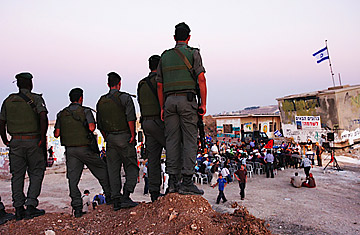
Israeli soldiers overlook a group of settlers who organized an evening conference on the site of Oush Grab
The hill named Oush Grab lies a stone's throw from the Shepherd's Field, near Bethlehem. Christian pilgrims flock to the place where the Bible says an angel tipped off a shepherd that Jesus Christ had been born, but most visitors are unaware of the battle raging over this obscure hilltop. Oush Grab is an undistinguished rocky outcrop of limestone, dotted with thorny shrubs. And it has no political, strategic or Old Testament significance. That's why the Israeli authorities allowed the Arab Christians of Beit Zahour, with help from educational agency Paidia International Development, to build a little park on its slopes, featuring a rock-climbing wall and a picnic ground. There were also plans to construct a $9 million children's surgical hospital on the upper reaches of Oush Grab, which would be the only one of its kind in the Palestinian territories.
Then one day last May, more than 100 Jewish settlers showed up on this hill of no consequence. They brought guns and paint brushes so they could scrawl "Death to Arabs" on a concrete pillbox left by the Israeli army when it pulled out several years ago. (The phantom guerrilla artist Banksy also found his way to this same fortification, stenciling onto it a wistful image of a truck towing away an Israeli tank.) And with the settlers came a phalanx of Israeli soldiers to provide protection.
Plans to build the desperately needed children's hospital — supported by Cure International, a worldwide charity helping disabled children — are now shelved. During one recent occupation of Oush Grab, a young Jewish extremist warned foreign-aid worker Jason Pollack, "We can't let you build the children's hospital here. Otherwise, we'll have to blow it up."
The settlers first arrived in May and have appeared a dozen times since, usually staying a few hours, blocking roads to the park and raising an Israeli flag, which is inevitably torn down by the Palestinian villagers as soon as the settlers and their military escort depart. The settlers make a religious-Zionist claim to Oush Grab, saying that because it is inside the biblical land of Judea and Samaria, it therefore belongs to Jews. "It's one more piece of Jewish homeland that the Arabs are trying to take away from us," says Nadia Matar, co-chairwoman of a right-wing Israeli group, Women in Green.
But legally, says Beit Zahour mayor Hani el-Hayek, Israelis never had ownership of the hill, which is surrounded on three sides by Arab villages and terraced groves of olive trees that are nearly 1,000 years old. It used to be a Jordanian army outpost. After Israel conquered the West Bank in the 1967 war, it became a small IDF fort. And when the Israeli army vacated Oush Grab, it reverted to the Jordanian army. Jordan renounced all claim to the West Bank after the 1993 Oslo peace accord, but Beit Zahour's mayor is hoping that if he gets the Jordanian army to sign over the land deed to the municipality, it will give him a stronger claim in Israeli court to fight the settlers. And of course, Israel's leaders recognize that the same West Bank to which the settlers claim a biblical right is land on which a Palestinian state will have to be built if a two-state peace solution is to be achieved.
Over the years, successive Israel governments have tacitly encouraged, and then failed to halt, the spread of Jewish settlements in the West Bank — a practice widely viewed as contravening international law. Often the settlers' behavior toward Palestinian neighbors is marked by violence; video footage shows Jewish youths using baseball bats to club Palestinian families trying to harvest their olive trees or tending sheep. Nor do the settlers fear reprisals from the Israeli authorities: human-rights group Yesh Din says only 8% of Palestinian complaints of settler violence have led to indictments by Israeli police.
But lately the Israeli mood has shifted against extremist settlers. In Hebron last week, they clashed not only with Palestinians but with the Israeli security forces as well, calling them "Nazis" and pelting them with stones. The settlers may rely on Israeli soldiers to shield them from attacks by Palestinians, but such is their rage against the Israeli state over the possibility that Israel could relinquish control over the West Bank in order to forge a two-state peace agreement with the Palestinians that they have turned on their protectors.
The Hebron attacks on the Israeli Defense Force (IDF) at last stirred the Israeli Cabinet into action against the settlers. In a Sunday Cabinet meeting, Yuval Diskin, the chief of Shin Bet, the domestic intelligence agency, warned that settlers would probably shoot back if the Israeli security forces tried to dislodge them en masse from West Bank outposts deemed illegal even under Israeli law. Says Diskin: "Their approach began with the slogan 'Through love, we will win' ... but has now reached 'Through war, we will win.'"
After hearing the security chief's grim appraisal, the Israeli Cabinet, reversing years of tacit support for the settlers, voted to cut off all funds and support for the 100 or so renegade outposts in the West Bank. But it is probably too little, too late. No Israeli leader, least of all a lame duck like outgoing Prime Minister Ehud Olmert, will risk a bloody showdown between Jewish settlers and Israeli soldiers. Officers warn that such a clash could lead to rebellion in the army ranks, since many of the IDF's gung-ho soldiers were raised in the West Bank settlements and share their messianic ideology.
As the settlers like to say, it's "facts on the ground" that count. And as long as the Jewish extremists can hold on to the hilltop and the Israeli army dithers over evicting them, it remains doubtful that the planned Palestinian children's hospital on Oush Grab will ever be built.
